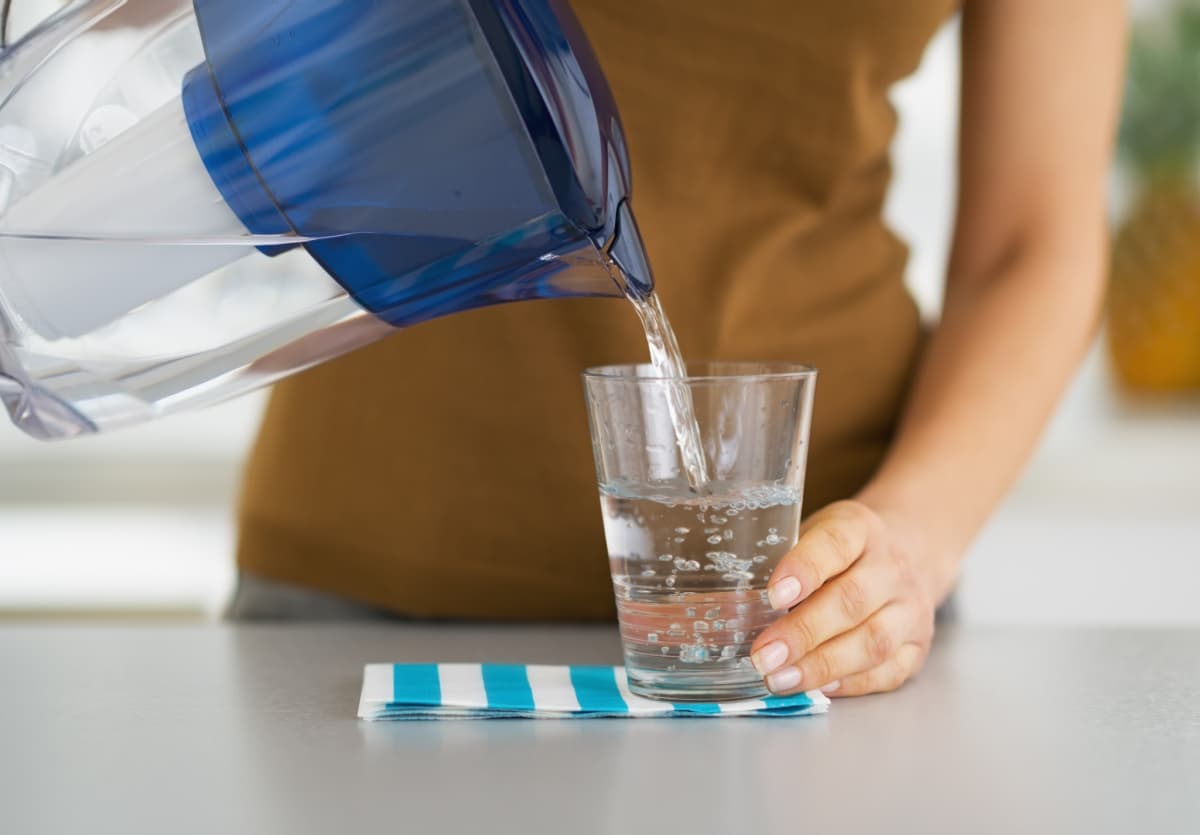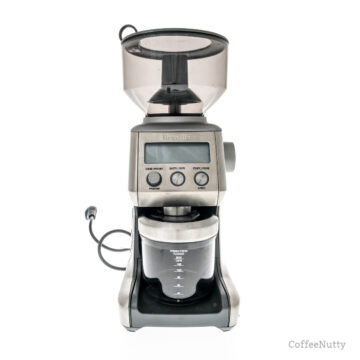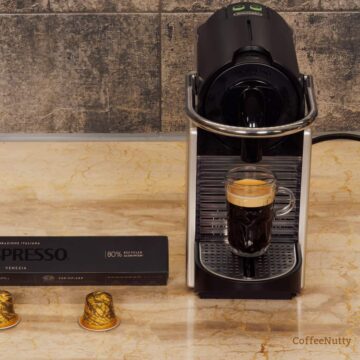One of the best ways to improve the flavor of coffee is to brew with filtered water. Water is, in fact, the main ingredient in brewed coffee, so its purity matters to the flavor of the beverage.
Coffee brewed with filtered water tastes better than coffee brewed with hard or unfiltered water because it has fewer contaminants interacting with the coffee beans' flavor.
Other important factors to brewing the perfect cup of coffee include the roast of the coffee bean, the amount of time it has to steep, and even the altitude at which the coffee was grown. But why are water contaminants important to brewed coffee flavor, and what is the best and most cost-effective way to purify water at home?

The Downside of Water Contaminants
A water contaminant is basically anything found in water that is not H2O. Contaminants cause odors, colors, and flavors in H2O. These flavors can interfere with the taste of your coffee. However, when filtered the water can taste pure and give you the perfect coffee.
Often called the "universal solvent", H20 can bond with and dissolve a variety of substances, fortunately including roasted and ground coffee beans.
All water contaminants may be categorized into one of the four following types:
| Physical | Sediment or organic material suspended in water from soil erosion |
| Chemical | Can be elements or compounds. Nitrogen, bleach, salts, pesticides, metals, toxins produced by bacteria, and human or animal drugs. |
| Biological | Organisms, microbes, or microbial contaminants such as bacteria, viruses, protozoan, and parasites. |
| Radiological | Unbalanced number of protons and neutrons resulting in unstable atoms that can emit ionizing radiation, like cesium, plutonium, and uranium. |
Which Minerals Are In Water?
Minerals are a touchy subject for coffee particles, which will combine and cause the beverage to taste the way it does. With too many minerals, the coffee can taste overpowered by them, and with too few, the coffee is left flat or bland, with less flavor. The mineral content of hard water is high, causing coffee brewed in that water to taste like those minerals. Municipal drinking water contains mostly these five minerals:
- Calcium
- Magnesium
- Bicarbonate
- Sulfate
- Fluoride
Brewed with unpurified water, your coffee may taste too much like magnesium or calcium and not enough like coffee. It may taste the wrong type of bitter, sour, or possibly both.
pH: Does It Matter?
The pH level, which tells how acidic or alkaline water is, also contributes to water's perceived flavor. The scale runs from one to 14 and the higher the pH, the more alkaline, while a lower pH means the water is more acidic. It is widely accepted that neutral water, having a score of 7 pH, is the best for brewing coffee. This is because it is not too alkaline or acidic.
Again, water is the most important ingredient of brewed coffee other than the roasted coffee beans, which is important. But what is the best way to treat your water at home as it pertains to your:
- Health
- Budget
- Coffee flavor
Let’s discuss the basics of two popular home water filtration systems: the Berkey and the Brita, as well as a peculiar alternative, reverse osmosis.
As an Amazon associate, I earn from qualifying purchases.
Filtration vs. Purification
Knowing the difference between filtration and purification will help you better understand what you are researching when you decide to purchase a method of water treatment. In short, water purification is more extreme than filtration. More particles are being separated from the water in purification than filtration.
The Common Filter: Activated Carbon aka Activated Charcoal
Activated carbon, also commonly referred to as activated charcoal, is the main material used in most home water purification systems. It is used in both the Brita and the Berkey, which are the two most popular home water filters, as well as whole home water filtration systems.
The key to activated carbon’s success in filtering water is that it is extremely porous. The substance has so many microscopic nooks and crannies that when water molecules flow through it, their larger contaminant passengers are suddenly blocked from continuing through.
Unwanted debris is cleared from the water this way, but activated carbon has a superpower in that it can also effectively remove chlorine from water through a chemical reaction.
Its extremely porous consistency is key to removing more than debris, however. An activated carbon filter is an important attribute to a home brewing method because it removes many common water impurities such as:
- Chlorine
- Pesticides
- Industrial solvents (Example: Turpentine)
Reverse Osmosis vs. Gravity Filters
A popular concept in water purification is the reverse osmosis method or RO. The reverse osmosis water purifying system forces water through a semi-permeable membrane, causing a separation between solids and liquid, in this case H20.
The critical difference between gravity filters like the Berkey and RO filters is that a high powered pump is being used in an RO system. In contrast, the Berkey lets gravity do the work of filtering the water.
As stated before, RO systems can purify your water to a degree that there are virtually no minerals left. This can cause deficiencies. However, studies have shown that consuming RO water when one is having a health problem related to water contaminants, RO water may be best as long as those missing minerals are being supplemented.
Choosing the Best Water Filter: Berkey vs. Brita
Most home water purification systems are gravity filters with activated carbon filters. It’s the most cost-effective water purification system we have invented to date. Here are some pros and cons for the two most popular brands of filter which share many similarities: the Berkey and the Brita.
What Is a Berkey and How Can It Help?
Although often thought to be a reverse osmosis (RO) system, the Berkey is actually a gravity filter. This means it uses gravity to pull liquid through a filter, which in the Berkey’s case, is an activated carbon filter. The Berkey container is made of stainless steel, which keeps the water cool and enures no plastic flavor.
- 99.99% of viruses
- Pathogenic bacteria
- Heavy metals
- Pharmaceuticals
- Countless more contaminants
The Berkey purifies water of these contaminants, all while leaving in the minerals that your body needs, as opposed to the complete demineralization that happens when water undergoes reverse osmosis or distillation.
The Brita: Another Powerful Purifier
The Brita pitcher is a standard household method for filtering tap water because it uses a similar method to the Berkey but on a smaller scale. The Brita pitcher is plastic as opposed to stainless steel like the Berkey, but they both utilize activated carbon filters to purify the water.
Berkey vs. Brita: How They Stack Up
At home I have tried both a Berkey and a Brita for filtering water and have found them both marginally better than using untreated tap water. When it comes to how they stack up to each other, the Berkey is going to give you slightly more filtered water per dollar; however, it is a more costly investment up front.
What Is Water Softening?
Water softeners filter large amounts of calcium and magnesium out of water. This is beneficial to your coffee's overall flavor because you can actually taste these minerals in higher concentrations versus lower concentrations.
You generally want your coffee to taste as much as possible like perfectly roasted, high quality coffee beans. Fewer contaminants mean more coffee flavor.
How Should You Filter Your Water For Coffee?
RO is in fact, the most effective water purification system in the world. So if you want the truest cup of coffee, do not turn down a cup brewed with water that has undergone reverse osmosis. However for your best daily cup, I recommend you utilize a Berkey or a Brita, whichever your budget favors and your heart desires.
RELATED:




